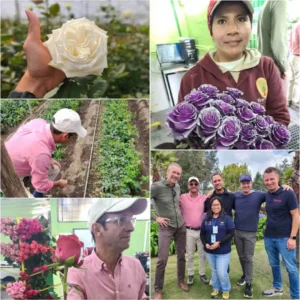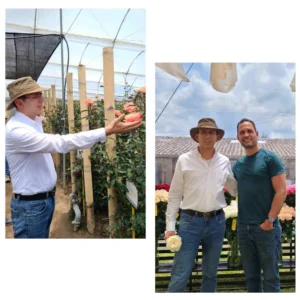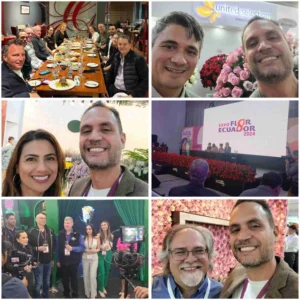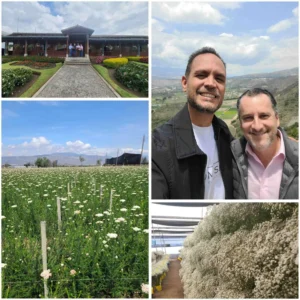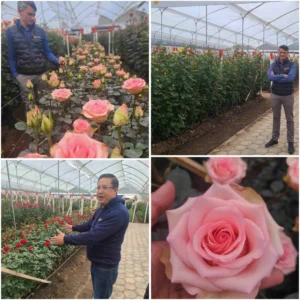My recent trip to Ecuador was a perfect mix of farm visits, reconnecting with the roots of my floral career, and immersing myself in the excitement of Expo Flor. The week was packed, starting with farm tours on Monday, followed by the vibrant Expo Flor convention that opened on Tuesday. It was an incredible opportunity to witness firsthand how Ecuador continues to lead the global floral industry through innovation, sustainability, and quality.
Day One: Hoja Verde, Mystic Flowers, and Rosa Prima
Monday began with a special tour organized by Pro-Ecuador and government representatives, who escorted us to visit three outstanding farms: Hoja Verde, Mystic Flowers, and Rosa Prima. Each stop showcased a different aspect of Ecuador’s floriculture excellence, from sustainable practices to cutting-edge breeding programs.
At Hoja Verde, founded by Eduardo Letort in 1997, I was struck by their commitment to doing things differently. The farm spans 60 hectares, and everything from growing to post-harvest processing happens on-site, ensuring top-quality, consistency and control at every step. Eduardo’s original vision was to reduce chemical use and hire workers directly, and that vision has evolved into a thriving operation that is socially responsible and eco-friendly. Ninety-nine percent of Hoja Verde’s employees are on permanent contracts, and their Fair Trade program directs 10% of rose sales into education and community development. This sustainable model is making a lasting impact on both the environment and the local community.
One thing I took away from this was Eduardo’s passion and openness to sharing. When we asked if there was anything we should avoid showing in pictures or in an article, he simply said, “We have no secrets. Our secret is in our purpose and focus on leaving a positive imprint on the Earth.
Our next visit was to Mystic Flowers, a newer player in the market, having been founded in 2019. Mystic has grown rapidly, now covering 120 hectares, and its focus is on wholesaling with a deep emphasis on variety selection. Mystic partners with over five different breeders to test new rose varieties. Their breeder testing area is designed to evaluate codes through a rigorous multi-stage process. It can take 1.5 to 2 years to decide if a code will go to market. Mystic’s evaluation process includes productivity, vase life, health, and color, ensuring only the best varieties are selected for commercial production. Their dedication to innovation and continuous improvement is evident in every aspect of their operation.
We wrapped up Monday with a visit to Rosa Prima, a well-known giant in the floral industry. Rosa Prima manages 190 hectares and is recognized for its focus on performance, sustainability, and quality. They test around 1,000 codes annually, of which only about 10 go commercial. The most critical aspect of their selection process is plant performance, as they aim for a production rate of 80 stems per square meter to ensure optimal pricing and quality. Rosa Prima has implemented a zip-line system to reduce transportation time from field to pre-cooling from 44 minutes to 19 minutes, significantly saving water and energy. This innovation alone allows them to conserve 80 million gallons of water annually. With 70% of its production going to North America, Rosa Prima has established itself as a leader in the U.S. market.
Tuesday: The Opening of Expo Flor
The next day, Tuesday, marked the official opening of Expo Flor, one of the most anticipated events in the global floral industry. The theme this year, “Bigger, Brighter, Bolder,” reflected the resilience and adaptability of Ecuador’s floriculture sector in the face of global challenges such as the pandemic, climate change, and economic uncertainty.
The convention featured representatives from 47 countries, highlighting Ecuador’s global influence in floriculture. Speeches emphasized the industry’s strength, especially its ability to adapt to economic instability and other crises. Gabriela Sommerfeld, Ecuador’s Minister of Foreign Affairs and Human Mobility, underscored Ecuador’s position as the third-largest flower producer in the world, with exports reaching 86 destinations. The U.S. remains the largest buyer of Ecuadorian flowers, with American consumers paying top dollar for the premium quality roses produced here.
Alejandro Martinez, Executive President of Expoflores, discussed the future of the industry, focusing on technological innovations and sustainability. Ecuador’s floriculture sector is committed to reducing its environmental impact, with a goal of becoming carbon-neutral by 2030. The Expo was a great opportunity to connect with industry leaders, explore new trends, and witness how technology is helping to streamline flower export processes and assist in analytics.
Wednesday: A Special Visit to Esmeralda Farms
Wednesday was a special day for me personally, as I visited Esmeralda Farms, where my floral career journey began. This visit was deeply meaningful, and I spent the day with Rodrigo Leiva, the president of Esmeralda, who gave me a personal tour. Esmeralda is known for its commitment to innovation and sustainability, and seeing their operations firsthand brought back many memories. Rodrigo’s passion for the industry was infectious, and we filmed a special episode of The Bloom Show during the visit, which made the day even more memorable. I will save the details for the video.
Thursday: A Private Tour of United Selections
Thursday was another highlight, as I had a private tour of United Selections, a breeder known for its meticulous breeding programs. United Selections collaborates closely with growers to test and select only the best-performing varieties for commercial production. Their breeding process is rigorous, involving several stages of evaluation to ensure that the varieties selected are resilient and of the highest quality. It was fascinating to learn about their approach and see firsthand how they are driving innovation in the industry.
Wrapping Up Expo Flor and a Grand Celebration
The rest of Thursday was spent at Expo Flor, visiting rose farm booths and searching for new products for my clients. The energy was incredible—vendors were excited to showcase their latest varieties, and I had the opportunity to explore a wide range of roses, each more stunning than the last. By the end of the day, the vendors were understandably exhausted from the non-stop activity, but the atmosphere was still buzzing with excitement.
The week concluded with an amazing party, featuring a buffet of traditional Ecuadorian dishes, live music, and a DJ that kept everyone dancing late into the night. It was the perfect way to celebrate the success of the week and the incredible contributions of Ecuador’s floral industry.
Reflecting on an Unforgettable Week
As I wrapped up my week in Ecuador, I was physically exhausted but mentally invigorated. The farm visits and the Expo Flor convention provided a comprehensive view of an industry that’s continually pushing boundaries in sustainability, technology, and social responsibility.
From Hoja Verde’s community-focused initiatives to Mystic Flowers’ dedication to innovation, and Rosa Prima’s exemplary standards in quality and sustainability, each experience enriched my understanding of the global impact of Ecuador’s floriculture industry.
The speeches at Expo Flor reinforced the sector’s resilience and its crucial role in Ecuador’s economy. The collaborative efforts between the government and private sector aim not just to increase production but to do so sustainably and ethically.
Visiting Esmeralda Farms was a personal highlight, reconnecting me with my roots in the floral world. The exclusive tour of United Selections added another layer of appreciation for the meticulous work that goes into bringing new rose varieties to market.
Ecuador’s commitment to excellence, from farm to international export, is truly inspiring. The country’s floriculture industry is a beacon of innovation and sustainability, setting standards for the rest of the world to follow. I’m leaving Ecuador not just with new business opportunities but with a renewed passion for the industry and an eagerness to contribute to its bright future.
Until Next Time, Ecuador
This trip was more than just a business venture; it was a journey through the heart of an industry that touches lives globally. I’m grateful for the experiences, the people I’ve met, and the insights gained. Ecuador, with its bigger, brighter, and bolder approach to floriculture, has left an indelible mark on me. I can’t wait to see what the future holds and to be a part of this vibrant community moving forward.

